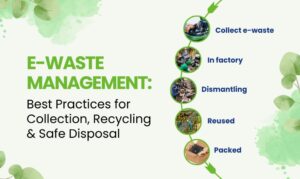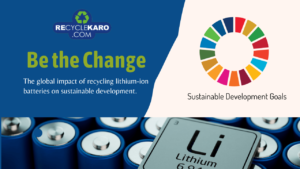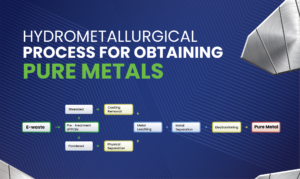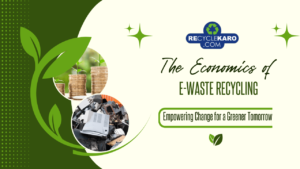E Waste Management: Best Practices for Collection, Recycling & Safe Disposal
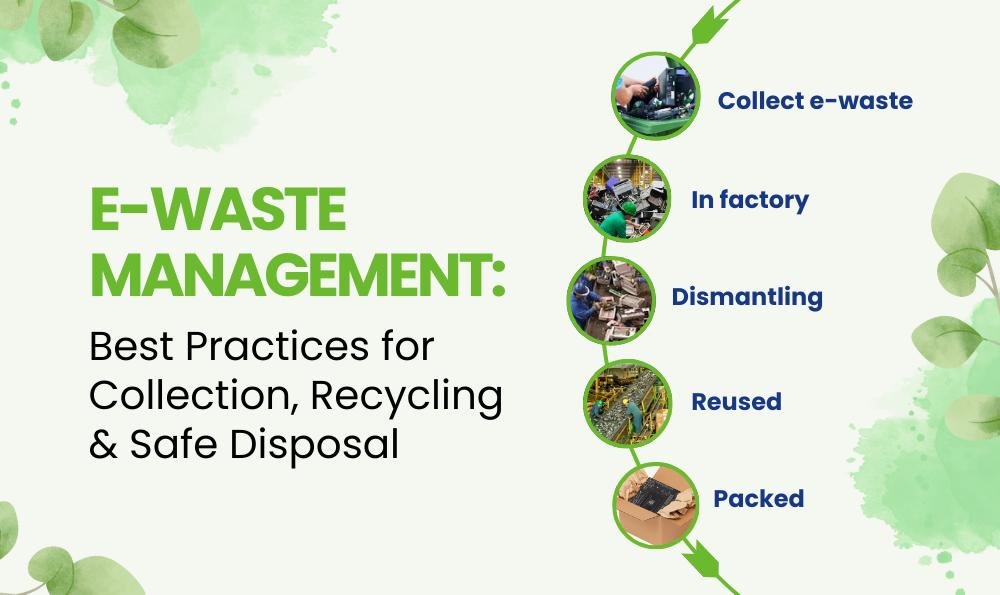
In India, the governance of electronic waste, commonly referred to as e-waste, holds significant importance owing to the increasing volume of e-waste produced annually. The inadequate disposal of electronic waste can result in substantial environmental challenges, as numerous hazardous substances ultimately find their way into landfills.
To address this challenge effectively, it is imperative to investigate environmentally viable electronic waste administration methodologies that emphasize the reclamation and elimination of technological refuse through formalized electronic waste reclamation initiatives.
Among the most efficacious protocols for accountable technological refuse elimination is ensuring that individuals appropriately discard their redundant electronic items, which may be accomplished through participation in structured electronic waste collection functions or by contributing operational devices to disadvantaged recipients.
The importance of e-waste recycling cannot be overstated. Proper handling and processing of this type of waste not only mitigates the environmental impact of e-waste but also facilitates the recovery of valuable materials.
Individuals and organizations must actively engage in the proper disposal of e-waste by utilizing available disposal methods that prioritize sustainability. Engaging in responsible practices will ensure that e-waste collected does not contribute to the growing crisis of improper disposal of electronic waste in India, thus fostering a culture of environmental stewardship that aligns with global best practices in electronic waste management.
Understanding the Landscape of E-Waste in India
E-waste refers to discarded electronic devices that are no longer functional or desired. This category iIndia ranks among the fastest-growing producers of electronic waste worldwide. Outdated smartphones, computers, household appliances, and even industrial electronics contribute to a massive volume of waste every year. Without proper disposal of e waste, toxic substances like lead, mercury, and cadmium can contaminate the environment and pose severe health risks.
Key factors driving this crisis include:
- Increased Consumption: With rising disposable incomes and widespread digital adoption, more electronic devices are in circulation.
- Short Lifespan of Devices: Frequent technological upgrades and planned obsolescence have shortened the lifespan of devices, increasing the need for effective e waste recycling in India.
- Lack of Awareness: Many consumers are unaware of the impact and benefits of proper e waste management in India.
- Inadequate Infrastructure: Limited access to formal recycling channels and proper e waste disposal near me options exacerbate the problem.
Addressing these challenges requires both individual responsibility and coordinated governmental and industrial initiatives, including the support of reputable e waste recycling companies in India.
The Importance of Proper E-Waste Disposal
Proper disposal of e-waste is crucial given its status as one of the fastest-growing forms of waste in the world. To manage e-waste effectively, individuals and organizations must adopt best practices for e-waste that emphasize the importance of responsible disposal. Electronic waste recycling not only prevents hazardous materials from contaminating the environment but also facilitates the recovery of precious metals like gold found within e-waste, thus contributing to sustainable resource management.
In India, where the challenges of growing e-waste are particularly pronounced, the implementation of comprehensive e-waste regulations is paramount. Effective handling of e-waste, including the recycle e-waste initiative, enables communities to dispose of e-waste responsibly while maximizing the benefits of the e-waste recycling process. Donating functioning electronic devices is another viable approach for disposing of electronic waste, thus minimizing the volume of waste generated.
Moreover, the development of a robust e-waste recycling infrastructure plays a pivotal role in reducing e-waste. By ensuring that electronic waste is properly recycled and waste is properly and safely disposed of, we can mitigate the environmental and health risks associated with e-waste. It is essential for all stakeholders to recognize and act upon their responsibility in this regard, fostering a culture of sustainability within our communities.
Environmental Impact
Improper disposal of e waste can lead to:
- Air Pollution: Unregulated incineration releases pollutants into the air, contributing to climate change.
- Soil Contamination: Toxic metals can seep into the ground, affecting agriculture and plant life.
- Water Pollution: Chemical runoff can infiltrate water sources, harming aquatic ecosystems.
Public Health Concerns
Exposure to hazardous materials can result in:
- Chronic Illnesses: Long-term exposure to toxic substances is associated with a higher risk of cancers and other chronic health conditions.
- Respiratory Issues: Inhalation of toxic fumes from burning e‑waste can trigger severe respiratory problems.
- Neurological Damage: Heavy metals like lead and mercury have been linked to developmental disorders, especially in children.
Economic Benefits of Proper E-Waste Management
Investing in responsible e waste management in India can also deliver economic dividends:
- Innovation: Advances in recycling technology support economic growth and help position India as a leader in sustainable practices.
- Job Creation: The growing e waste recycling business can create significant employment opportunities in collection, processing, and logistics.
- Resource Efficiency: Recovering valuable materials reduces the need for mining and raw material extraction.
Effective E Waste Disposal Methods in India
Effective e waste management starts with understanding the lifecycle of e-waste, from its collection to its final recycling or disposal. Whether you’re searching for methods for disposal of e-waste are safe or looking to connect with e waste recycling near me, the following best practices form the cornerstone of responsible management.
1. Safe Collection and Segregation
The journey of proper disposal of e waste begins with safe collection and segregation. Establishing dedicated drop-off points and collection centers can help keep hazardous components separate from general waste.
- Community Collection Drives: Local drives not only boost e waste collection from home but also raise public awareness.
- Educational Campaigns: Informing communities on what is e waste management and how to segregate it correctly is key.
- Designated Drop-off Centers: These centers simplify the process for those who search for e-waste collection near me and provide a structured method for initial handling.
2. Responsible Recycling and Material Recovery
Once e‑waste is collected, the next crucial step is recycling e waste through responsible material recovery processes. This involves dismantling devices, safely extracting toxic components, and recovering valuable materials like gold, copper, and rare earth metals.
- Eco-friendly Technologies: The adoption of greener processing techniques is increasingly critical for maintaining high environmental standards.
- Mechanical and Chemical Processing: These advanced methods help in safely separating hazardous materials, ensuring that methods for disposal of e-waste are environmentally sound.
- Resource Recovery: By recovering precious metals and plastics, recycling not only minimizes environmental impact but also fuels the e waste recycling business.
3. Safe Disposal of Non-Recyclable Materials
Not every component in e‑waste can be recycled. For non-recyclable parts, safe and controlled disposal of e waste is essential to protect public health and the environment.
- Secure Landfills: Specially designed landfills prevent hazardous substances from leaching into the soil and water.
- Thermal Treatment: Controlled incineration with energy recovery is another option, provided that emissions are strictly regulated.
- Continuous Monitoring: Ensuring that disposal sites remain within regulatory standards is vital for long-term environmental safety.
Read More: Effective E waste Disposal Methods in India
Make an Informed Decision: Understanding Your Role
In the context of modern society, particularly within India, the management of e-waste has become a pressing concern. Understanding your role in the disposal of e-waste is crucial, as improper practices can lead to environmental hazards. One effective approach to dispose of your e-waste would be to donate e-waste items that are still functional, thus contributing to the cycle of reusability. Additionally, participating in e-waste collection drives assists in the responsible management of discarded electronics.
It is imperative to recognize that e-waste contains various toxic materials, and as such, the management of e-waste necessitates collaboration with certified e-waste recyclers. Being actively involved in initiatives that promote the safe handling and collection of e-waste can significantly mitigate the risks associated with e-waste generation. Furthermore, educating oneself about the critical aspects of e-waste enables you to make informed decisions that reflect the importance of responsible e-waste disposal.
For Consumers
- Educate Yourself: Learn about the proper channels for disposal of e waste and the benefits of recycling e waste.
- Look for Take-Back Programs: Many brands now offer take-back services, which are especially useful if you’re wondering e waste disposal near me.
- Reduce Consumption: Prioritize quality and longevity when purchasing new electronics to minimize e‑waste generation.
For Businesses
- Implement Take-Back Programs: Offering incentives for returning outdated devices can streamline e waste collection from home.
- Corporate Social Responsibility (CSR): Integrate e‑waste management practices into CSR initiatives to enhance your brand image.
- Partner with Certified Recyclers: Engage with reputed e waste recycling companies in India to ensure safe processing.
For Policy Makers
- Strengthen Regulations: Enforce robust standards for disposal of e waste and e waste management in India.
- Incentivize Recycling: Provide financial incentives for companies that invest in sustainable e waste recycling practices.
- Public Awareness Campaigns: Support initiatives that educate the public on what is e waste management and its importance.
Donation: A Sustainable Alternative
In the context of sustainable practices, donation emerges as a viable alternative to conventional waste management. In India, effective management of surplus goods through charitable contributions not only minimizes environmental impact but also fosters social responsibility. This approach underscores the importance of community engagement in promoting sustainability.
Benefits of Donating Electronics
- Extends Device Lifespan: Donating functioning devices can prevent premature disposal and reduce the need for new device manufacturing.
- Bridges the Digital Divide: Donations enable underprivileged communities to access technology and education.
- Reduces E-Waste: Every donated device is one less unit ending up as hazardous e waste.
How to Donate Responsibly?
- Assess Device Functionality: Ensure that the electronics can be refurbished or are still in good working condition.
- Find Reputable Organizations: Look for NGOs or charities that specialize in technology donations.
- Data Security: Always remove personal data and, if possible, obtain an e waste certificate verifying that the device has been wiped clean before donation.
Work with a Certified Recycler
Choosing the right partner for recycling e waste is critical. Not all recyclers are equal, and working with certified professionals ensures that your electronic waste is managed in an environmentally responsible way.
What to Look For in a Certified Recycler?
- Regulatory Compliance: Ensure the recycler meets all local and national standards for e waste management in India.
- Transparency: A good recycler is open about its processing methods and environmental impact.
- Proven Track Record: Check reviews and testimonials—often, those searching for e waste buyers near me or e waste disposal near me can rely on trusted certifications and endorsements.
- E Waste Certificate: Reputable recyclers provide proper documentation and certification, ensuring the recycling process meets legal and environmental standards.
Benefits of Certification
- Efficient Resource Recovery: Certified facilities are more likely to recover valuable resources effectively, bolstering the overall e waste recycling business.
- Environmental Safety: Certified recyclers employ best practices to minimize the environmental impact of disposal of e waste.
- Legal Compliance: Using certified services helps companies and individuals comply with environmental regulations.
Extending the Life of Your Electronics
Extending the life of your electronics is a critical aspect of sustainable management practices, particularly in India. By adopting effective maintenance routines, users can significantly enhance the longevity of their devices. This proactive approach not only conserves resources but also reduces electronic waste, contributing to environmental preservation.
Tips to Prolong Device Longevity
- Regular Maintenance: Routine cleaning, software updates, and preventive care keep your electronics in optimal condition.
- Upgrading Components: Instead of replacing the entire device, consider upgrading parts such as batteries, memory, or storage.
- Proper Usage: Use devices under recommended conditions to avoid undue wear and tear.
- Repair Over Replacement: Whenever possible, repair rather than replace malfunctioning components.
Benefits of Extending Device Life
- Reduced E-Waste: Fewer discarded devices contribute to a significant reduction in environmental pollution.
- Cost Savings: Maintaining and upgrading devices can be more economical than purchasing new equipment.
- Sustainable Consumption: Encourages a culture of responsible consumption and sustainable e waste management practices.
Leverage Cloud Computing
Modern digital solutions like cloud computing offer innovative ways to reduce reliance on physical hardware, thereby cutting down on e waste.
How Cloud Computing Helps?
- Reduced Hardware Dependency: Cloud services reduce the need for physical infrastructure, lowering the risk of generating additional disposal of e waste.
- Resource Efficiency: Data centers optimized for energy efficiency help decrease the overall environmental footprint.
- Scalability: Businesses can scale operations without investing in new, resource-intensive hardware, contributing indirectly to more sustainable e waste management in India.
Moving to the Cloud
- Assess Your Requirements: Identify aspects of your operations that can transition to the cloud.
- Choose Reputable Providers: Select cloud service companies known for their commitment to sustainability.
- Maintain Data Security: Ensure compliance with regulatory standards even as you shift to a cloud-based model.
Upgrade with Trade-Ins
Trade-in programs have become a popular way to manage e waste. They encourage consumers to return their outdated devices in exchange for discounts on new products, creating a circular economy in the tech industry.
Benefits of Trade-In Programs
- Encourages Responsible Disposal: Financial incentives ensure that old devices are returned rather than discarded haphazardly.
- Boosts Recycling Rates: Trade-in schemes channel devices to certified e waste recycling companies in India where they can be processed responsibly.
- Supports Innovation: Materials recovered from returned devices can be reinvested in developing sustainable technologies and innovative e waste recycling business models.
How to Participate?
- Research Trade-In Offers: Many brands and retailers promote trade-in programs, making it easier to locate e waste buyers near me.
- Ensure Certification: Always verify that the program partners with certified recyclers.
- Stay Updated: Look for evolving trade-in models that are designed to support sustainable disposal of e waste practices.
See How We Can Solve Your E-Waste Recycling Needs
At the intersection of environmental responsibility and technological advancement lies the potential for transformative change in e waste management. One company that stands out in this arena is Recyclekaro. As a leader among e waste recycling companies in India, Recyclekaro offers comprehensive solutions that span from e waste collection from home to fully certified recycling services.
How Recyclekaro Helps?
- Efficient Collection and Logistics: With easily accessible drop-off points and home collection services, Recyclekaro addresses queries like e waste collection near me efficiently.
- Certified Recycling Process: Their rigorous, environmentally compliant processes ensure that every step—from disposal of e waste to final material recovery—is handled safely.
- Transparent Documentation: Clients receive an e waste certificate to document proper recycling, providing peace of mind and ensuring regulatory compliance.
- Nationwide Reach: Serving diverse regions across India, they offer e waste recycling in India solutions that meet local needs, including areas where you might be searching for e waste recycling near me.
- Expertise and Innovation: As part of the booming e waste recycling business, Recyclekaro not only meets current demands but is also innovating for a sustainable future.
By choosing Recyclekaro, individuals and businesses alike can contribute to a cleaner environment while ensuring their electronic devices are managed responsibly.
Electronic Waste Disposal & Management – What All Is Involved in the Process?
Managing electronic waste is a multifaceted challenge that requires a detailed and systematic approach. Here’s a comprehensive look at the entire process:
- Collection: E‑waste is gathered from homes and businesses via e-waste collection from home services or designated centers. Whether you search for e-waste collection near me or rely on community drives, the first step is safe collection.
- Transport: Specialized logistics ensure that e‑waste is securely transported to processing facilities.
- Pre-Processing: Devices undergo sorting, dismantling, and segregation into various material streams to prepare them for recycling.
- Recycling: Advanced technologies extract valuable components such as metals and plastics, vital for recycling e waste effectively.
- Safe Disposal: Residual, non-recyclable materials are disposed of using secure landfills or thermal treatment options, ensuring that disposal of e waste is environmentally sound.
- Monitoring and Compliance: Continuous oversight guarantees that every stage of the process adheres to strict environmental and regulatory standards.
This integrated approach not only mitigates the environmental impact of discarded electronics but also supports a thriving circular economy, making what is e waste management a dynamic and essential part of modern sustainability.
Final Thoughts
As technology advances in India, so does the challenge of managing electronic waste. The key lies in responsible practices—whether it’s opting for e-waste collection from home, finding reliable e-waste buyers, or choosing certified recycling solutions. Searching for “e-waste recycling near me” is just the first step; real impact comes from informed decisions and sustainable habits. From trade-in programs to cloud computing, every choice we make, big or small, helps reduce waste and protect the environment.
Partnering with experts like Recyclekaro ensures your discarded electronics are handled safely, with proper certification for peace of mind. By embracing smarter consumption, regular maintenance, and local recycling initiatives, we can create a future where technology and sustainability go hand in hand.
FAQs
1. What is e-waste management, and why is it important?
E-waste management refers to the proper collection, recycling, and disposal of discarded electronic devices like computers, smartphones, and appliances. It is crucial to prevent environmental pollution, conserve valuable resources, and reduce health hazards caused by toxic materials in e-waste.
2. How can I find e-waste collection or recycling near me?
Many certified recyclers, such as Recyclekaro, offer e-waste collection from home and designated drop-off points. You can search online for “e-waste recycling near me” or check with local municipal authorities and recycling companies for proper disposal options.
3. What are the best methods for disposing of e-waste?
The most responsible ways to dispose of e-waste include:
- Donating working electronics to extend their life
- Trading in old devices for newer models
- Recycling through authorized e-waste recyclers
- Properly dismantling and processing e-waste to recover valuable materials
4. How do I know if an e-waste recycler is certified?
Look for government-authorized e-waste recycling companies in India that provide an e-waste certificate, ensuring compliance with safety and environmental regulations. Certified recyclers follow proper disposal and recycling methods to minimize environmental harm.
5. Can businesses and individuals earn money by recycling e-waste?
Yes, many e-waste buyers purchase old electronics for recycling purposes. Businesses and individuals can also participate in trade-in programs or sell bulk e-waste to recycling companies that recover valuable metals and components.
